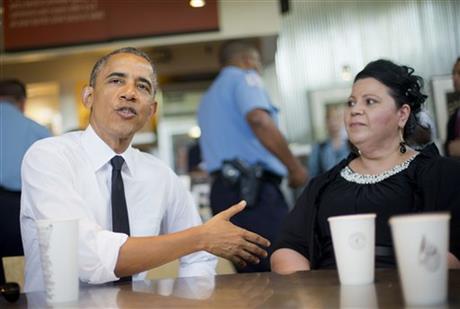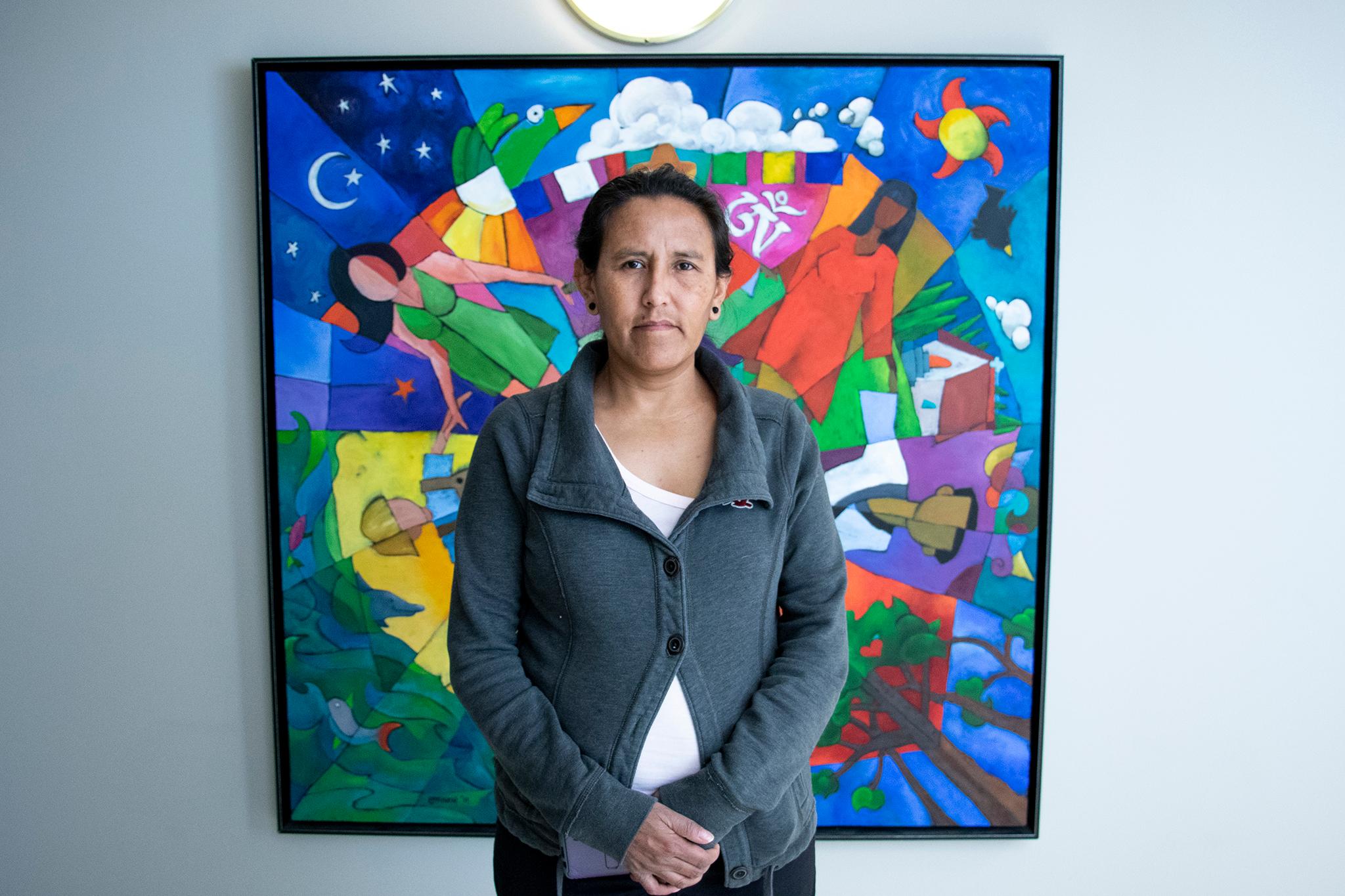
For Shelby Ramirez Martinez, the surgeries came as a one-two financial punch: first an emergency gallstone removal, and then days later a last-minute eye operation.
The Denver woman wasn’t the patient either time; her 17-year-old daughter had the gallstones, her aging father suffered from vision problems brought on by diabetes. But for Ramirez Martinez, the unpaid days off she took to care for them were too much for her budget to bear.
“There were prescriptions; there were blankets and pillows that they needed,” Ramirez Martinez remembered. “And that little bit of menial stuff just sent my finances into a tailspin and I got an eviction notice and my (electricity) was going to get shut off.”
Until recently, Ramirez Martinez worked housekeeping and security at a Denver hotel, making little more than minimum wage. That long stint of leave was more than three years ago, but her family’s financial hardships remain; there’s another eviction notice taped to her wall, and a basket of unpaid bills on her kitchen table.
As a primary caretaker for her large extended family, Ramirez Martinez says she’s endured financial struggles and retaliation at work trying to be with them when they need her.
“It’s very difficult: emotionally, physically, mentally, economically,” she said.
A movement is born
Angry at her situation, Ramirez Martinez joined the ongoing movement to push for a statewide paid leave program. Last spring she traveled to the White House and discussed the issue with President Barack Obama at his Summit on Working Families.
President Obama made family leave an issue in his State of the Union address earlier this year. Facing a Republican Congress hostile to the idea, the president called on states and local governments to pass paid leave programs of their own.

“We are the only advanced country on earth that doesn’t guarantee paid sick leave or paid maternity leave to our workers,” said President Obama. “And that forces too many parents to make the gut-wrenching choice between a paycheck and a sick kid at home.”
The Bureau of Labor Statistics estimates 13 percent of all workers had access to paid family leave in 2014. For low wage workers, that figure drops to 5 percent.
The 22-year-old Federal Family and Medical Leave Act requires employers with 50 or more workers provide up to three months a year of unpaid, but job-protected, leave for qualified reasons.
A group of Colorado’s Democratic state lawmakers want to greatly expand on FMLA's protections. They’re on the verge of introducing a bill to create a mandatory state-run paid leave insurance program covering all workers, and all employers.
Under the proposal, every worker in Colorado would have several dollars a week deducted from his or her paycheck and in return could apply to have a portion of those lost wages repaid, if they had to take time off after the birth of a child or to care for a very ill relative or for a long-term medical condition of their own.
“This is really about family values,” said House sponsor Faith Winter, D-Westminster. “It’s about supporting hard working Coloradoans and making sure the economy works for everyone.”
The program wouldn't come cheap. With a similar bill that failed last year, nonpartisan legislative analysts estimated it would cost tens of millions of dollars and require hiring scores of new state workers to get the insurance program up and running. Backers are hoping that some changes in this year's bill will bring that price tag down, but say whatever the cost, the idea is worth it.
“This is one of the most essential functions of government, is protecting the health and safety and welfare of our people,” said Jessie Ulibarri, D-Sherrelwood, the bill’s Senate sponsor.
Rhode Island, New Jersey, and California are currently the only states with paid leave programs similar to what Colorado is considering. In California, less than three percent of the workforce files a claim each year and the most of the people who do use it for maternity or paternity leave.
A recent analysis by California’s state Senate staff found that fewer low wage workers use the leave program. That’s likely because California only reimburses people up to 55 percent of their income, too little for minimum wage workers to get by on. In response to that finding, Colorado’s program repays wages on a sliding scale; the less money a worker makes, the higher share of their income would be repaid.
“We want to make sure the people who need the … the paid time the most are really able to access it,” said Erin Bennett, chapter director for 9-to-5 Colorado, one of the advocacy groups pushing for the program.
Some businesses groups not on board
Backers of the leave proposal have a couple of progressive business organizations on their side, but so far the idea is meeting a lot of resistance from Colorado’s larger business groups.
Employers worry that if worker premiums aren’t enough to fund the program, they’ll end up footing the bill. And in the short term they complain that administering the deductions could be a headache.
“Payrolls are very complicated and need to be predictable,” said Loren Furman, lobbyist for the Colorado Association of Commerce and Industry. “So when you … mandate employers to change their payroll processes, that’s just one more step that creates more expenses for them.”
For smaller companies, the change would go way beyond payroll processing.
Currently, employers with fewer than 50 workers don’t have to offer any kind of time off. But the proposed bill would allow every worker in the state to take up to three months of qualified family leave a year, no matter their employer’s size, and still have a job to come back to afterward.
Steve Roper, over of Roper’s Insurance, warns that for his company, and for the other small businesses he works with, holding a job open for three months could be a logistical nightmare.
“Typically with small employer groups, people are usually doing one, two, three jobs all at once. And there aren’t extra people to step in to fill that position,” Roper said. “Your customers won’t wait for you to replace. They’ll go down the street to go to somebody who can service them.”
With the business community opposing the paid leave program, it is unlikely to pass the Republican-controlled Senate. And the state's top Democrat isn't a fan of the concept either.
"What we’ve said for the past couple years is, we are very, very supportive of our business community, but especially our small businesses. They’re really the job creators," Hickenlooper told CPR's Colorado Matters last month.
The National Federation for Independent Business recently surveyed its Colorado members on the idea. According to chapter head Tony Gagliardi, more than 90 percent opposed it.
Gagliardi agrees that not having paid leave may put some workers in a tough position, but rejects the entire notion of a state-run leave program.
“I really sympathize for them, I really understand; I’ve had personal issues, we all have,” Gagliardi said. “But it’s not government’s role to step in and try to solve that issue.”
More employers, employees react
We wanted to hear more about what state residents think of the state proposed paid leave program. Below, some of the responses that we received from our Public Insight Network from employers and employees.
Gordon Seirup, founder, Copper Leaf Creative, a small web design firm in Loveland:
I think having a paid leave program as described is a great benefit to the employee, and without financial burden on the employer. Filling in with a temp if the time off is lengthy is a small inconvenience.
Sandra Payne, president, Denver Concrete Vibrator, a Front Range manufacturer of specialty construction equipment:
Providing some paid time off is an ethical and humane practice. Many companies, like mine, may be meeting the needs of employees without being required to offer a state-mandated number of days. Maybe industry-specific requirements should be established. For example, hospitality and retail, which generally require less specific training and often don't offer paid time off, could have certain rules, and manufacturing, which often has very stringent needs, can be held to a standard more logical for that industry. It's difficult for the state to try and ensure equality, and it is necessary, but I don't think there is a one-size-fits-all solution.
Erica Kalkofen, founder and owner, EK Kitchens and Design, a Winter Park-based remodeling company:
This story is part of our ongoing exploration of Colorado kids who are living in poverty, how it affects their lives and our common future. We'd like to hear your ideas about about what can be done about child poverty in Colorado. Share your thoughts through our Public Insight Network. PIN sources helped in the reporting of this piece.









